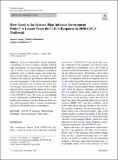Files in this item
How good is the science that informs government policy? A lesson from the U.K.’s response to 2020 CoV-2 outbreak
Item metadata
| dc.contributor.author | Cooper, Jessica | |
| dc.contributor.author | Dimitriou, Neofytos | |
| dc.contributor.author | Arandelovic, Oggie | |
| dc.date.accessioned | 2021-10-15T11:30:02Z | |
| dc.date.available | 2021-10-15T11:30:02Z | |
| dc.date.issued | 2021-10-14 | |
| dc.identifier | 275568756 | |
| dc.identifier | 24087bd2-fe7a-4525-807f-64273f06be1c | |
| dc.identifier | 85116972251 | |
| dc.identifier | 000707992500001 | |
| dc.identifier.citation | Cooper , J , Dimitriou , N & Arandelovic , O 2021 , ' How good is the science that informs government policy? A lesson from the U.K.’s response to 2020 CoV-2 outbreak ' , Journal of Bioethical Inquiry , vol. Online First . https://doi.org/10.1007/s11673-021-10130-2 | en |
| dc.identifier.issn | 1176-7529 | |
| dc.identifier.uri | https://hdl.handle.net/10023/24147 | |
| dc.description.abstract | In an era when public faith in politicians is dwindling, yet trust in scientists remains relatively high, governments are increasingly emphasizing the role of science based policy-making in response to challenges such as climate change and global pandemics. In this paper we question the quality of some scientific advice given to governments and the robustness and transparency of the entire framework which envelopes such advice, all of which raise serious ethical concerns. In particular we focus on the so-called Imperial Model which heavily influenced the government of the United Kingdom in devising its response to the COVID-19 crisis. We focus on and highlight several fundamental methodological flaws of the model, raise concerns as to the robustness of the system which permitted these to remain unchallenged, and discuss the relevant ethical consequences. | |
| dc.format.extent | 8 | |
| dc.format.extent | 475141 | |
| dc.language.iso | eng | |
| dc.relation.ispartof | Journal of Bioethical Inquiry | en |
| dc.subject | Covid-19 | en |
| dc.subject | Epidemic | en |
| dc.subject | Methodology | en |
| dc.subject | Modelling | en |
| dc.subject | Decision-making | en |
| dc.subject | Public policy | en |
| dc.subject | BJ Ethics | en |
| dc.subject | JN101 Great Britain | en |
| dc.subject | Q Science | en |
| dc.subject | T-NDAS | en |
| dc.subject | SDG 13 - Climate Action | en |
| dc.subject.lcc | BJ | en |
| dc.subject.lcc | JN101 | en |
| dc.subject.lcc | Q | en |
| dc.title | How good is the science that informs government policy? A lesson from the U.K.’s response to 2020 CoV-2 outbreak | en |
| dc.type | Journal article | en |
| dc.contributor.institution | University of St Andrews. School of Computer Science | en |
| dc.contributor.institution | University of St Andrews. School of Medicine | en |
| dc.identifier.doi | 10.1007/s11673-021-10130-2 | |
| dc.description.status | Peer reviewed | en |
This item appears in the following Collection(s)
Items in the St Andrews Research Repository are protected by copyright, with all rights reserved, unless otherwise indicated.

